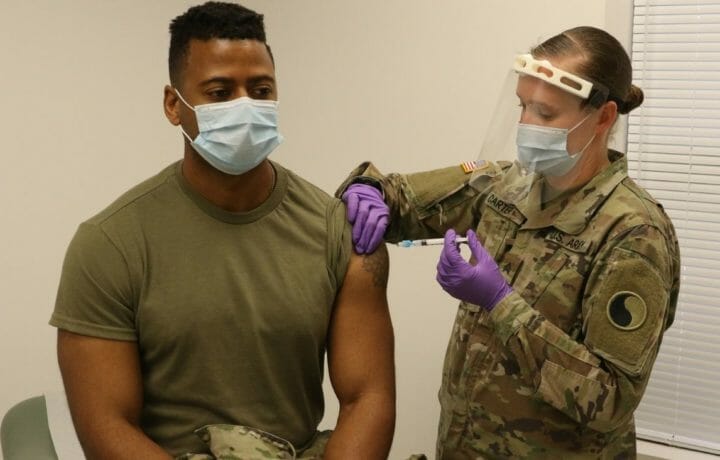Follow Twitter for any length of time and you quickly realize that people have opinions about a lot of things. Some people get a little hot under the collar about decisions about the ACFT. Others feel the need to weigh in on the COVID-19 vaccine. Motives get interpreted and opinions get launched to whoever will listen. If social media gets to weigh in on your life choices, does your employer get a say? Should you have to show your employer proof of your COVID-19 vaccine card? Some universities are already making that decision for the fall, requiring a vaccine in exchange for the option to return to campus.
Military and the COVID-19 VACCINE
While the COVID-19 vaccine has yet to be required for the military, full FDA approval could change that. So far, while the vaccine is under emergency use authorization (EAU), leadership has leaned into strongly encouraging troops to get vaccinated now.
“We are committed to contributing to the president achieving his goal of 200 million shots in 100 days,” said Acting Assistant Secretary of Defense for Health Affairs Dr. Terry Adiritm during a briefing at the Pentagon. While the Pentagon remains committed to communicating facts and alleviating concerns or mistrust, they are also working hard to move towards a fully vaccinated military. For the Navy, fully vaccinated crew members on board means relaxed social distancing and quarantining measures.
“Vaccination is one critical part of getting our country back to normal, along with continued testing and adherence to public health measures like masking and social distancing,” Adirim said. “We just can’t let up at this point. Our DOD personnel have done a phenomenal job. I’m very proud of all of them. We’ve administered more than 1.8 million shots within DOD and more than 5 million shots have gone into arms by military service members in support of the FEMA mission.”
The State of the Civilian World
Despite the COVID-19 vaccine EAU status, the reality is that the world is somewhat on new ground here. While legal requirements may accommodate those with disabilities or religious beliefs, by and large, many entities, like universities or healthcare facilities have historical precedent to stand on in requiring employees or students to get the vaccine. While some federal agencies – like the DoD – are directly providing vaccines to employees, others have left the process up to employees to work through their state and local health departments. However, at this point, the communication has remained as strong encouragement and not a mandate. Contractors who work on government sites have generally followed the federal agency’s protocols, leaving off site employees more leeway on the vaccine.
While different employers will operate under different assumptions or practices, President Biden has called on all employers to provide time off for employees to get the vaccine. The Society for Human Resource Management (SHRM) notes that while employees have rights to be considered under the Americans with Disabilities Act (ADA), Title VII of the Civil Rights Act of 1964 (Title VII) and other workplace laws, according to the EEOC, those same policies can also turn the vaccine into a requirement, given the nature of the pandemic. The ADA can offer a ticket out for some employees who do not wish to get the vaccine, while at the same time, shape overall workplace policies that highlight health or safety threats that unvaccinated employees could pose.
Bottom Line on the Vaccine Debate?
Mandates depend on your office. Reports are trickling in about workers getting a pink slip when they refuse to get a vaccine, but these reports are still the vast minority. If you have a reason for not getting the vaccine – you likely have the law on your side.
“Managers and supervisors responsible for communicating with employees about compliance with the employer’s vaccination requirement should know how to recognize an accommodation request from an employee with a disability and know to whom the request should be referred for consideration,” the EEOC said.
For now, incentives, encouragement, accommodations, and communication are likely to be the difference between a united and divided workplace.



